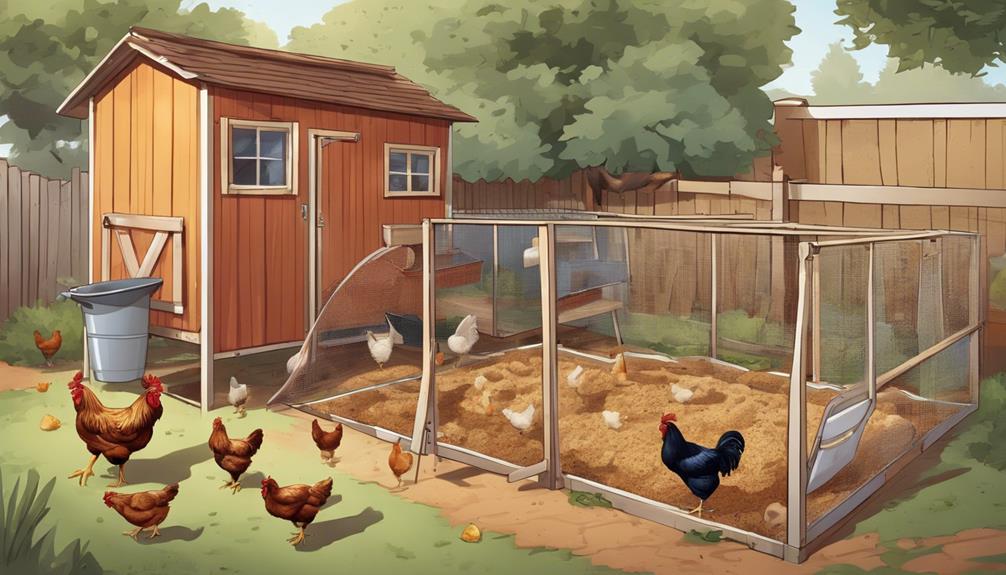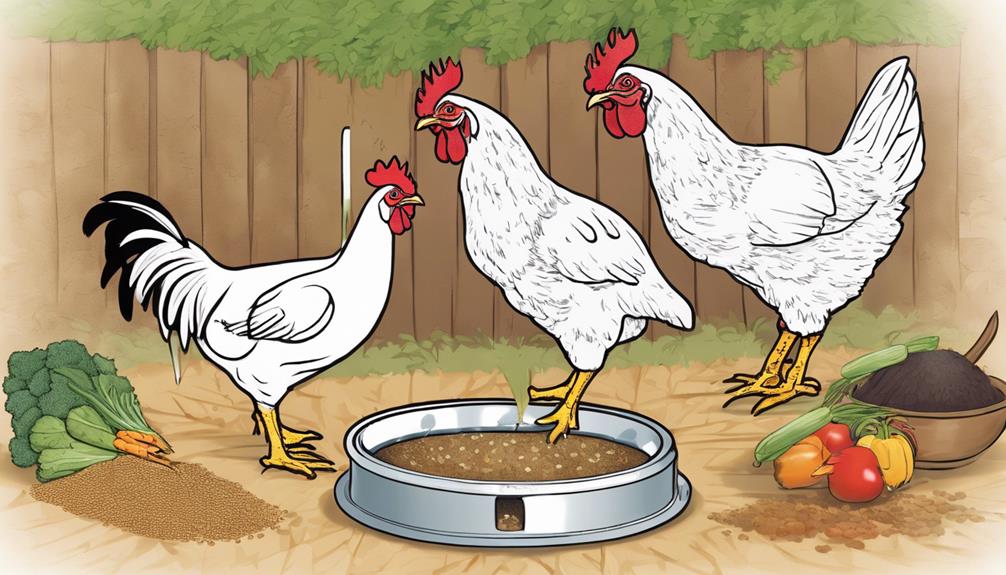While backyard chickens enjoy the freedom of pecking around at their leisure, their feeding schedule shouldn't be left to chance. You've likely pondered the balance between providing enough nutrition without overfeeding, aiming for optimal health and egg production. It's essential to understand that the secret lies in the timing and composition of their diet.
From selecting premium feed to managing the right amount of treats, striking this balance is more an art than a science. Let's explore how you can tailor a feeding regimen that meets their needs at every life stage, keeping them healthy and your egg basket full.
Key Takeaways
- Free-choice feeding allows chickens constant access, optimizing health and egg production.
- Scheduled feeding controls portion sizes, preventing overfeeding and nutritional deficiencies.
- Treats should not exceed 10% of the diet to maintain balance.
- Adjust feeding practices based on flock needs to support productivity.
Understanding Chicken Diets
To ensure your backyard chickens thrive, it's crucial to grasp their dietary needs, which hinge on a balanced intake of protein, calcium, and essential vitamins. Feeding your flock involves understanding that chickens eat a variety of foods, but relying on a complete layer feed is essential. This type of feed ensures they get the right amounts of protein, crucial for egg production, alongside calcium for strong eggshells and vitamins for overall health.
A solid foundation in the diet of backyard chickens should include feed that contains 16-18% protein. This isn't just about meeting their dietary requirements but also about supporting their well-being through the provision of essential amino acids. These components are vital for their development and productivity.
Furthermore, while considering what chickens eat, remember that the variety in their diet can come from treats or supplements, especially if you're aiming for a vegetarian diet. However, these should be seen as additions to the complete layer feed, which remains the cornerstone of their nutrition. It's this balanced approach to feeding, focusing on protein, calcium, vitamins, and amino acids, that will keep your backyard chickens healthy and productive.
Selecting Quality Feed
Now that you understand chicken diets, it's crucial to pick the right type of feed that meets their nutritional needs.
You'll need to decide between organic and conventional feed, each with its pros and cons.
Knowing the types of chicken feed and their nutritional content will ensure your backyard chickens are healthy and productive.
Types of Chicken Feed
Selecting the right type of chicken feed is crucial for the health and productivity of your backyard flock. Understanding the different options can significantly impact your chickens' well-being and the efficiency of your feeding schedule. Here's what you need to know:
- Layer Feed: Available as mash, crumbles, or pellets with a protein content of 16-18%. It's essential for laying hens, ensuring balanced nutrition and robust egg production.
- Calcium Supplements: Crushed oyster shells promote strong eggshell formation, critical for laying hens.
- Scratch Feed: While tempting, it should be used sparingly. It's not a complete diet and lacks essential nutrients.
- Feeding Different Age Groups: A strategic approach is needed to cater to the diverse nutritional requirements of various age groups within your flock.
Nutritional Requirements
After exploring the types of chicken feed, let's focus on the nutritional requirements essential for your backyard chickens' health and productivity. Quality layer feed, containing 16-18% protein, meets the nutritional needs of your flock and supports robust egg production. This feed should also have a balance of amino acids, vitamins, and minerals. Whether you're choosing pellets, mash, or crumbles, selecting ones with quality ingredients ensures your laying hens maintain optimal health.
Incorporating supplemental calcium, like crushed oyster shells, into their feeding schedule is crucial for producing strong eggshells. Additionally, offering amino-acid rich treats can complement their diet, especially if it's primarily vegetarian. This balanced approach to nutrition keeps your chickens healthy and productive, laying the groundwork for a successful backyard flock.
Organic Vs. Conventional Feed
When deciding between organic and conventional feed for your backyard chickens, it's crucial to understand the differences in their production and potential impact on your flock's health.
Here are four key aspects to consider:
- Organic feed is made without synthetic pesticides or fertilizers, avoiding GMO ingredients and synthetic additives.
- Conventional feed may contain GMOs and synthetic additives for cost-effectiveness but often includes antibiotics and growth hormones to promote faster growth.
- Certification standards ensure organic feed complies with organic farming practices, offering health and environmental benefits.
- Health and environmental benefits of organic feed are preferred by some for promoting a more natural growth process and sustainable farming practices, contrasting with the potential downsides of conventional options.
Feeding Techniques
Often, implementing the right feeding technique can significantly enhance the health and productivity of your backyard chickens. You've likely considered the benefits of both free-choice feeding and scheduled feeding. With free-choice feeding, your chickens can eat at their own pace, which reduces competition during meal times. This method ensures they're never without food, but it's essential to keep an eye on their consumption to avoid overeating, especially in meat birds.
On the other hand, scheduled feeding helps you control portion sizes, monitor food intake, and establish a routine for your flock. It's a proactive approach to prevent overeating and ensure that every chicken gets its fair share of the feed. Regardless of the method you choose, always ensure water is easily accessible. Dehydration can swiftly lead to serious health issues, so clean, fresh water must be available at all times.
Tailoring your feeding practices to match your flock size can optimize health and productivity. It's not just about the amount of food but understanding the needs of your chickens. By monitoring their food consumption and adjusting portion sizes accordingly, you'll create a feeding schedule that supports a thriving backyard flock.
Managing Scraps and Treats

To ensure your backyard chickens stay healthy, it's crucial to manage their intake of scraps and treats carefully. While it's tempting to share kitchen scraps or let them indulge in their favorite chickens scratch, maintaining a balanced diet is essential. Here are four key strategies to keep in mind:
- Limit Treats to 10% of Their Diet: Treats can be a fun addition to your chickens' diet but shouldn't exceed 10% to ensure they get the essential nutrient balance they need.
- Choose Healthy Treats: Opt for healthy options like dried mealworms or small pieces of fruit. These can provide nutritional benefits without the risks that come with excessive treats.
- Monitor Treat Consumption: Keep an eye on how much and how often your backyard chickens are getting treats. Overdoing it can lead to obesity and other health issues.
- Be Cautious with Scraps: Not all kitchen scraps are suitable for chickens. Limit scraps to ensure you're not disrupting their diet's nutritional balance.
Cost-Effective Feeding Strategies
After exploring how to manage scraps and treats, let's focus on how you can feed your backyard chickens in a cost-effective manner. For those with larger flocks, implementing a free-choice feeding schedule emerges as a cost-effective strategy. This approach allows chickens to access food as they need, aligning with efficient feeding strategies that cater to the flock's natural feeding behavior.
However, if you're managing a smaller flock, scheduled feeding might be your go-to method. This system enables you to control portion sizes and minimize food wastage, making it an economical choice. By monitoring food availability and the flock's consumption, you can adjust the feeding schedule and portion sizes accordingly, ensuring you're not overspending on feed.
Tailoring your feeding practices to the specific needs of your flock is crucial. Every flock is unique, and by closely monitoring their food intake and adjusting the feeding schedule, you ensure not only the health and happiness of your backyard chickens but also manage to keep feeding costs down.
Addressing Diet-Related Issues

You mightn't realize it, but sticking to an ideal feeding schedule can help you tackle nutritional deficiencies and overfeeding concerns in your backyard chickens.
By ensuring they're not eating too little or too much, you're directly supporting their health and egg production.
Let's look at how you can adjust their diet to prevent these common issues.
Nutritional Deficiencies
Addressing nutritional deficiencies in backyard chickens is crucial, as imbalanced homemade feed formulations can lead to health issues. To ensure your chickens don't suffer from a lack of essential nutrients, consider these steps:
- Switch to commercial feeds: Designed to prevent common dietary deficiencies, these feeds contain the right balance of protein, amino acids, and calcium.
- Supplement with oyster shells: Specifically for calcium, this prevents eggshell quality issues.
- Monitor feed intake: Ensure your chickens are consuming a diet that meets their nutritional needs.
- Balance homemade chicken feed: If you prefer mixing your feed, research and follow recipes that offer a balanced diet to avoid nutritional deficiencies.
Overfeeding Concerns
While it's tempting to spoil your backyard chickens with extra treats, overfeeding can lead to significant health problems including obesity and decreased egg production. Monitoring their feed intake and sticking to a controlled feeding schedule is crucial to prevent these issues and maintain their optimal health.
| Health Issue | Cause |
|---|---|
| Obesity | Overfeeding |
| Fatty liver disease | Excessive treats |
| Decreased egg production | Nutritional imbalance |
| Joint problems | Excessive snacks |
Limiting access to treats and ensuring a nutritional balance in their diet can help avoid health problems. Remember, overfed chickens may also suffer from heart issues and a reduced lifespan. Prioritizing their health over the immediate satisfaction of extra snacks will ensure they live a happy, productive life.
Conclusion
In summary, keeping your backyard chickens healthy starts with understanding their dietary needs and selecting quality feed. You'll want to adopt proper feeding techniques, manage how many scraps and treats they get, and find cost-effective ways to feed them.
Also, be on the lookout for diet-related issues. Remember, a balanced diet with the right nutrients is key to ensuring your chickens thrive. So, stay informed, be mindful of their nutritional needs, and your feathered friends will reward you with their best.